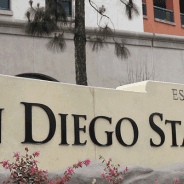Search results for :
McDonough Professor Named Finalist for 2017 edX Prize
Ricardo Ernst has been named as one of the 10 finalists for the 2017 edX Prize for Exceptional Contributions in Online Teaching and Learning. Ernst is the Baratta Chair in Global Business and professor of operations and global logistics at the Georgetown McDonough School of Business. Continue reading…
Vault’s Top Investment Banks for MBAs to Work for in 2018
While a career in investment banking may not be as highly sought after anymore among MBAs, it’s still a fairly popular option. And according to a U.S. News interview with Jeff McNish, Assistant Dean of the Career Development Center at the University of Virginia’s Darden School of Business, investment banks and consulting firms are raising their compensation offers to draw in more students. These companies are willing to pay a premium to draw MBA talent. The question is, which are the best investment banks to work for?
Vault Banking 50 recently released its annual ranking of the best investment banks in North America. The list was compiled through a survey of 2,400 banking professionals and used a weighted formula to review such issues as quality of life—including culture, satisfaction, work/life balance, training, and compensation—and overall prestige.
This year, Goldman Sachs took the #1 spot—with a score of 8.380—maintaining its title of “best investment bank to work for.” Coming in at a close second was Evercore (8.311), followed by Centerview Partners (8.308), and Morgan Stanley (8.114).
The top 10:
- Goldman Sachs
- Evercore
- Centerview Partners
- Morgan Stanley
- Moelis & Company
- Greenhill & Co.
- Lazard
- Perella Weinberg Partners
- Bank of America
- PJT Partners
Goldman Sachs Still #1
This was the second year in a row that Goldman Sachs took the top spot, with survey responders saying such things as: “The firm is extremely focused on improving work/life balance. In the time that I’ve been here, I’ve seen a tremendous difference, not only as a result of formal policies but also in the culture and mindset of those who work here.”
Respondents also said that Goldman Sachs provided workers with various benefits including “exposure to talented, thoughtful, respectful colleagues” and “challenging, intellectually stimulating assignments.” Even respondents at Goldman Sachs’ competitors had mostly nice things to say. They called the firm “a finance machine” and “the gold standard.”
Other elements that set Goldman Sachs apart include its protected-weekend-day policies for junior bankers, no-working-past-midnight policies for interns, and fast-track promotions. It was also one of the first banks to provide a modern performance review system as well as to implement video interviews during on-campus recruiting.
Other Investment Banks Making Waves
As for Evercore, it rose two places in 2018 from #4 to #2. Much of its rise in placement was due to its increase in prestige as well as the company’s focus on a better working environment for its employees. In fact, Evercore came in first place in two areas: formal training and informal training.
As for what some of the survey respondents had to say about Evercore: “We have an outstanding, very teamwork-oriented, and collaborative culture. The firm is filled with very intelligent people treating each other with respect and working together to give clients the best advice possible. The atmosphere is very positive—lots of high fives on wins and no dressing-down calls if you miss a piece of business.”
In third place, Centerview Partners is a small boutique investment banking firm. Insiders stated that the firm is filled with “extremely talented, smart, and thoughtful senior bankers” and that “deal opportunities are unparalleled.”
Another boutique investment bank to make it to the top of the list was Moelis, which ranked fifth. The firm rose four places this year thanks to its “great culture” and “smart dedicated people.”
Investment Banks Focused on Diversity
The Vault Banking 50 also measured firms’ focus on diversity. Loop Capital Markets led the way for the second year in a row, coming in first for overall diversity, minority diversity, female diversity, and LGBT diversity. However, following close behind were Evercore (which placed #2 in overall diversity, female diversity, and minority diversity) and Goldman Sachs (which placed #3 for overall diversity, minority diversity, and LGBT diversity).
To see the full report, visit the Vault.com.
This article has been edited and republished with permissions from Clear Admit.
What Employers Do and Don’t Look for In An MBA Graduate
Earning an MBA can often be a huge boost for graduates entering the job market, from opportunities for upper-level management roles to increased salaries.
But securing that job post-graduation can still be an uphill climb. Even with an MBA, students often find themselves struggling to understand how they fit within a changing job market. As the market continues to shift, understanding exactly what employers are looking for in their MBA applicants—and what they aren’t looking for—can be crucial for graduates as they search for and apply for their perfect job.
Thankfully, a recent survey from the Financial Times looked at the job market from the perspective of employers: what they are in need of in terms of MBA job seekers, and how MBA applicants can be more realistic regarding for the roles for which their new degree will qualify them. Unfortunately for many MBAs, the survey results may come as a surprise when they reflect on what skills they hoped their degree would offer in the first place. Yet, a critical understanding of what employers are and aren’t looking for can help job seekers re-frame the way they understand themselves and their prospective careers.
What Employers Want
The survey looked into the most important skills that employers look for in new MBA talent. Perhaps surprisingly, the five most important skills determined by the survey were actually not core MBA subjects. “Soft skills,” such as the ability to prioritize (desired by 72 percent of employers), the ability to work with a variety of people (76 percent of employers), and the ability for employees to effectively manage their time were the most desired and difficult to find, according to the survey.
The most difficult skills to recruit—the skills companies are sorely in need of—were most commonly named as the ability to use social media for the business’ needs, financial forecasting, big data analysis, brand storytelling skills, and the ability to train others.
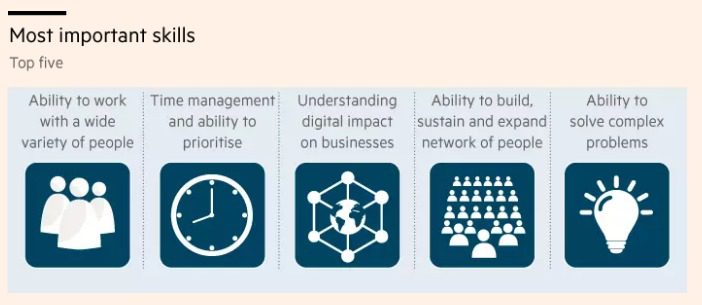
The five most important skills, according to the Financial Times survey.
What Employers Don’t Want
The least important skills for an MBA, according to the survey, were those most often thought of as “hard skills,” such as specialized skills in marketing, finance, programming, or complex statistical skills. Similar skills were mentioned as the least difficult skills to recruit—the ability to solve complex problems and specialized marketing skills are often seen as common fare among MBA graduates and therefore a candidate with such skills won’t necessarily stick out.
Many surveyed employers said that past experience with MBA-holding employees had left them disappointed, with the degree-holder having difficulty turning concepts into practice. Many employers said that, while an MBA degree may be a nice bonus for a job candidate, the overall hiring decision is more based on the individual’s industry qualifications, rather than their degree.
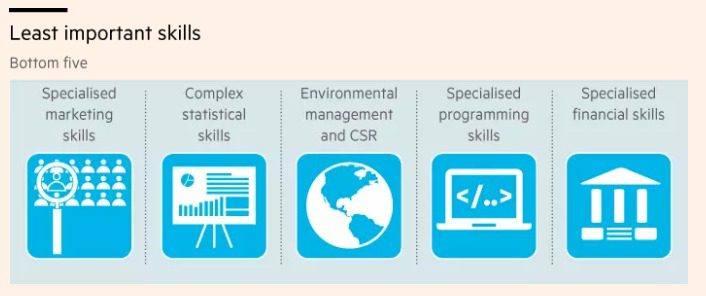
These skills may be less necessary than MBA grads anticipate.
What Do You Need To Do?
So far, the results of the Financial Times survey may be disappointing for MBAs who have worked hard for their business education. No need to get concerned just yet, however. The employer response may have less to do with the idea that the skills of an MBA grad aren’t necessary in a company and more to do with a perception gap; the belief that business schools will not teach students the skills they need, and therefore that they do not need MBAs at their company.
Most of the work in convincing a skeptical employer your degree is worthwhile is simply convincing them that the skills learned as part of your degree are the same ones they desire. Many business schools are attempting to change the way MBAs are perceived and the type of skills that are associated with graduates. Julie Morton, Associate Dean of Careers Services and Corporate Relations at Chicago’s Booth School of Business, has already set half of her team to the work of promoting the value of MBA-holders in the workforce. Overall, much of the work will fall on business schools to market their graduates as holding the skills most desired by recruiters.
On a more individual level, however, the survey results also indicate that MBA grads can be more judicious in the roles that they apply to and the way they market themselves to potential employers. By focusing on the skills desired most—and the hardest to recruit—and ensuring that employers know these are the exact skills an MBA education offers, both employer and employee can benefit.
You can read the rest of the Financial Times survey here.
Wharton Professor Barbara Kahn Examines Walmart/Google Partnership
Wharton School marketing professor Barbara Kahn shared her insight on the brand new partnership between Walmart and Google on Wharton Business Radio. Kahn was generally positive about the partnership, asserting that it was necessary for Walmart to acquire a tech platform to keep up with online competitors like Amazon.
“People feel competing against Amazon is a very tough proposition, and I want to see competition there,” Kahn said. She was optimistic about the partnership, particularly because Walmart is committed to having a multitude of items available for voice shopping with Google Assistant. According to Kahn, “The firm that owns the shopping list is the firm that has a big advantage…In the future, as the home becomes more connected and people become more used to talking to Alexa or Siri in building their shopping lists, you really need to be in that game. It’s forward thinking.”
Kahn debated with Mark A. Cohen, Director of Retail Studies at Columbia Business School, who favored a much less hopeful outcome for the partnership.
“It is a positive step, but it’s a baby step that I would say doesn’t necessarily lead anywhere,” Cohen said, “The intersection of Walmart’s customer base and Google’s users is so small that this is likely to be insignificant.” Cohen also mentioned that Google Express in itself has yet to develop a sizable customer base, so may not be particularly useful in helping Walmart compete with online platforms.
As far as increasing e-commerce sales, Walmart has been steadily improving its track record. In fact, the company posted a 60 percent growth in this area for the July-ending quarter. This trend is due to its recent purchases of online retailers like Jet.com.
Though Kahn agreed with some of Cohen’s concerns about the partnership, she held that Walmart’s prices can compete with Amazon’s, and there are a considerable number of people who are shopping using platforms like Google Assistant.
MBA Alumni Spotlight: Eddie George – Former NFL Star
Eddie George is a true renaissance man. A triple (possibly quadruple) threat whose Midas touch has graced the disparate fields of professional football, Broadway (as Billy Flynn in “Chicago”), sports commentary, and wealth management, George is a testament to how far dogged determination, resilience, and a little moxy can take you.
After nine years with the Tennessee Titans and Dallas Cowboys, George pivoted to a career as an entrepreneur with George Enterprises, an umbrella brand that encompasses a number of ventures, including Edward N. George Wealth Management, landscape architecture firm EDGE Group, health and fitness magazine EGX Lifestyle, and domestic abuse nonprofit Visions with Infinite Possibilities.
When pressed about his staggering array of accomplishments, George told Rolling Stone, “To put yourself in a box of, ‘Well, I’m only a football player and I’m just going to stick to being in sports somehow,’ you’re not living a full human being experience.
We took a closer look at the life and career of America’s favorite polymath to understand how George parlayed his skills on the field to so many different outlets.
Early Life and Education
To say George was obsessed with football as a youngster growing up in Philadelphia would be an understatement of gargantuan proportions. In the aforementioned Rolling Stone profile, George recalls that the game was an anchor, a vector, and a lens through which he saw the world. “High school football. Little league football. Backyard football. Thanksgiving football. You name it. It was not only a passion, it was life. It was also a vehicle for me to pursue my dreams.”
George earned a scholarship to Ohio State after rushing a record 1,372 yards in his fifth year at Fork Union Military Academy. Over the course of three years at Ohio State, George surpassed and set new school records and generally continued his reign on the field. In 1995, George was recognized as a first-team All-American and won the coveted Heisman Trophy, which remains one of George’s most significant achievements. He explains, “To win the Heisman gave me the resolve that if I put my mind to it, I could do it. It taught me a valuable lesson of what can be accomplished.”
An Illustrious NFL Career
George’s nine-year career began when the Houston Oilers (currently Tennessee Titans) selected George in the first round of the 1996 NFL draft.
George’s record suggests a reliably brilliant player whose excellence is surprisingly overlooked: a ’96 Rookie of the Year Award, four consecutive Pro Bowls (1997-2000), and one Super Bowl appearance, in which George tallied two touchdowns in a nail-biting 23-16 loss to the St. Louis Rams.
After eight seasons with the Titans and one with the Dallas Cowboys, George retired in 2005. In a 2009 Kellogg School of Management profile, George spoke openly about the realities of what he could not fathom up until his very last season: a life, post-football. “Nine years goes by like this. And if you don’t take care of your money, you’re out on the street. It’s a scary feeling. You ask yourself, what’s next?”
At The Northwestern Kellogg School of Management
After retiring from the NFL, George was determined to find a way to keep moving forward but after 20 years immersed in the game, that was easier said than done, as George explained in 2009:
“I had to find something that was going to fill that void of putting my jersey on on Saturday and Sundays. One was my identity. Two, was figuring out what I would do next. Three, I had to ask myself what I was going to the next 60 years of my life to make money to maintain my lifestyle, to grow and build, and to take care of my family financially.”
George was brutally honest about his state circa 2006 in an interview with SB Nation: “To wake up and not know what you’re going to do with your time because you can no longer do the one thing that you’ve been doing your entire life, it’s daunting.”
As George explains in a Winter ’09 Northwestern Profile, “My celebrity status definitely helped open doors, but that will only take you so far.” After a few successful years at George Enterprises, he opted to attend Kellogg to “broaden and deepen his understanding of the business side.”
George was thrilled at the opportunity Kellogg gave him to reinvent and brand himself away from football. He explained in a Kellogg profile that he chose the school because of its reputation.
“Like on the football field, if I’m going to be the best at something, I’m going to learn from the best coaches, the best teachers. Kellogg resonated because of the strong branding and marketing emphasis.”
George graduated with an Executive MBA from Kellogg in 2009.
Edward N. George Wealth Management
After graduating from Kellogg in 2009 and receiving his securities agent and investment advisor licenses, George almost immediately considered how to use his business acumen in service of his fellow athletes. He told ESPN, “When I came into the league, I didn’t understand all the financial terminology. I lost some money in personal investments that I shouldn’t have. I want kids coming out of college to be more prepared for the financial side.”
George partnered with Greg Eastman, his own personal financial advisor of over two decades, and Scottsdale-based First Financial Equity Corp, to found Edward N. George Wealth Management—a boutique financial management firm that helps athletes get their finances in order via estate planning, tax planning strategies, retirement, and income planning.
Wealth management was a homecoming of sorts for George as it brought together a number of his diverse interests, according to a previous interview with the Nashville Post: “My life’s mission is entrepreneurship, entertainment and education. The wealth management firm is both entrepreneurship for me and education for the players.”
Business, University Leaders Speak Out Against DACA Repeal
When the Trump administration formally announced yesterday that it would end the Deferred Action for Childhood Arrivals program (DACA)—putting a six-month expiration date on legal protections granted to approximately 800,000 people who entered the U.S. illegally as children—universities and business leaders were quick to condemn it. Indeed, vocal defense of the “Dreamers,” as those in the DACA program are called, resounded from Silicon Valley to the Ivy League.
“Dreamers contribute to our companies and our communities just as much as you and I,” tweeted Tim Cook, CEO of Apple and an MBA graduate of Emory’s Goizueta Business School. “Apple will fight for them to be treated as equals.” In an earlier statement Cook noted that Apple employs hundreds of people covered by DACA.
Facebook CEO Mark Zuckerberg released his own statement on his personal Facebook page. “This is a sad day for our country,” he wrote. “The decision to end DACA is not just wrong. It is particularly cruel to offer young people the American Dream, encourage them to come out of the shadows and trust our government, and then punish them for it.” He added that the young people covered by DACA contribute to their communities and to the economy. “I’ve gotten to know some Dreamers over the past few years, and I’ve always been impressed by their strength and sense of purpose. They don’t deserve to live in fear.”
DACA was enacted in 2012 under former President Barack Obama by executive order, allowing individuals who were brought to the United States as children or teens before mid-2007 to apply for protection from deportation and work permits. To apply, they had to be younger than 31 at the time the program was created, have come to the U.S. before turning 16, and have lived in the U.S. for at least five years. The U.S. Citizenship and Immigration Services reports that roughly 788,000 have had their requests for DACA status accepted.
University and Business School Leaders Denounce DACA Repeal
A Center for American Progress survey of roughly 3,000 DACA recipients found that approximately 72 percent of respondents were in higher education, 13 percent of those pursuing master’s degrees. And leaders in higher education—including at several leading business schools—were every bit as vocal as major business leaders in calling out the Trump administration’s decision and pledging their support to Dreamers.
Geoffrey Garrett, dean of the University of Pennsylvania’s Wharton School, called the repeal of DACA “bad for the economy and bad for society” in a tweet that also expressed his support for an official statement issued earlier in the day by University of Pennsylvania President Amy Gutman.

Maryellen Reilly, Wharton Deputy Vice Dean for Admissions, financial aid and career management, quoted from Gutman’s statement in her own tweet: “At Penn, we are committed to providing a safe and welcoming environment for all of our students and we will do everything we can…”

Columbia University, home to Columbia Business School (CBS), issued its own statement in opposition to the repeal of DACA. “Columbia unequivocally opposes the ending of DACA and is working with others in higher education to urge Congress and federal officials to reinstate DACA’s protections and protect the rights of those with DACA status during and after the ‘wind-down’ process that has been announced,” it read. It went on to add that in keeping with Provost John Henry Coatsworth’s November pledge, “our policies and plans aim to ensure that students who had DACA coverage are able to proceed unimpeded with their studies and that all students in the community feel safe and understand beyond question that Columbia’s dedication to inclusion and diversity, including of undocumented students, is and will remain unwavering.” CBS quickly retweeted its parent university’s stance and linked to the full statement.
And the Haas School of Business at the University of California at Berkeley tweeted: “We stand with our undocumented students.” That tweet linked to a statement issued by three ranking university administrators—Chancellor Carol Christ, Vice Chancellor for Equity & Inclusion Oscar, and Undocumented Student Program Director Meng So—that called on the Berkeley community to stand with undocumented scholars at the university and beyond.
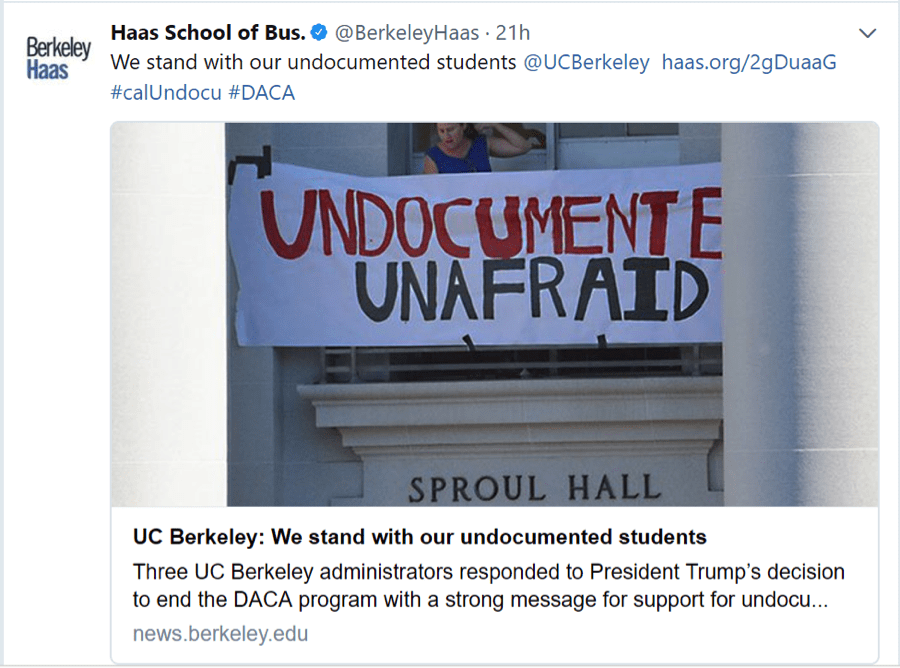
“At a time when our campus and community values are being challenged by the prevailing national rhetoric and policy making, we must deepen our resolve and commitment to our principles and to each other,” read the Berkeley administrators’ statement. “During these difficult moments, we must defend strongly held values of dignity, diversity and community.”
The Kelley School of Business at Indiana University at Bloomington, for its part, retweeted its parent university’s official statement and pledge to support all its students.

In the statement, IU President Michael A. McRobbie called out the decision to end DACA “especially in light of the administration’s prior statements expressing support for young people protected by DACA and the strong bipartisan support that exists nationwide for maintaining the program.”
McRobbie went on to underscore the university’s support of all its students. “We believe that all of our students, regardless of their background or country of origin, bring to our campuses unique perspectives and experiences that enrich our living and learning communities,” he wrote. “In doing so, they reflect who we are—and what we strive to be—as a university that provides all students with the opportunity to expand their knowledge and succeed in a place where they feel valued, respected and at home.”
In fact, IU features an entire website—DACA @ IU—dedicated to helping DACA students at the university. On the website, the university states that though bound by state and federal laws, it will take steps to support all IU students regardless of documentation and will only inquire into a person’s immigration status when required by law. IU also provides counseling and support to students who have immigration-related concerns, including connecting students with available resources for educational and living expenses.
Penn, Columbia, Berkeley, and IU are just a few of countless schools that spoke out against the Trump administration’s decision. Prior to the final decision to end DACA, 600 college and university presidents signed a statement promoting DACA back in November. Even more recently, Duke University’s President Vincent E. Price wrote a letter in support of the program, and University of Michigan President Mark Schlissel made a statement as part of the university’s September 1st convocation saying, “I would like to reiterate to all of our students, from our own state, elsewhere around the country, and from all around the world, that you are welcome here … You make us a stronger university and enrich our community and nation by your many talents, hard work, and the diverse perspectives and life experiences you bring to campus.”
As information continues to be provided by the Trump administration, many universities and schools are preparing to provide up-to-date information for their DACA students and all who are affected. Check in with your school for more information.
This article has been edited and republished with permissions from Clear Admit.
Matthew Hanson Named Director of Chapman Entrepreneurship Center
Matthew Hanson has officially taken over as Director of the Ralph W. Leatherby Center for Entrepreneurship, which is a part of the Argyros School of Business and Economics. For the past five years, Hanson has worked at Chapman as an adjunct professor.
Hanson has been affiliated with Chapman long before taking over his new director role, having graduated from the Argyros MBA program 30 years ago. After he earned his MBA, Chapman attended USC’s Aerospace Engineering Ph.D. program.
Under Hanson’s leadership the center will continue its mission of providing resources such as workshops and mentors to those aspiring to launch start-ups. Chapman boasts that the center is, “empowering and energizing student and alumni entrepreneurs, through connecting and collaborating with investors and mentors and offering different innovative programs and events.”
Chapman allows students to take full advantage of the resources at the center by offering them the option to minor in entrepreneurship or to choose an emphasis in entrepreneurship. The center also offers Launch Labs, wherein Entrepreneurship Teams can receive intensive education and mentorship to speed up their launch and success.
Hanson is replacing former Directo, Shan Steinmark, who led the center from 2014-17, and was one of the center’s mentors for before he took over. Steinmark previously co-founded companies like EyeOnBusiness Institute and Strategic Transitions Research.
For Hanson, the new position has meant resigning from his career at Brea-Based Coulter Inc., where he was a Senior Program Manager. He also served as a lieutenant colonel in the U.S. Air Force, wherein he took on roles such as Secretary of the Air Force in Washington, D.C.
Quinlan Dean Kevin Stevens Honored by Crain’s Chicago Business
Quinlan School of Business Dean Kevin Stevens has officially been named to the 2017 Who’s Who in Chicago Business list. Continue reading…
How the Chicago Booth School of Business Helps Low-Income Applicants
U.S. News and World Report lists University of Chicago’s Booth School of Business among its top three best business schools in the country. But with the school’s estimated tuition (including living expenses) for the 2017-18 year at $103,759, Booth may not sound like a practical option for a number promising candidates. Though the $126,937 average base salary of graduates is definite proof of return on investment, for many, the cost of tuition may make the idea of earning a Booth MBA seem impossible. Fortunately, the myriad loan and scholarship options available at Booth may make a Booth MBA more feasible for students from all economic backgrounds.
Those of you craving a challenging higher education experience at one of the most prestigious institutions in the U.S. can breathe a sigh of relief. Below, we’ve laid out some of the resources available to help low-income applicants fund their MBA education at Booth School of Business.
Scholarships and Fellowships
Though Booth does not offer need-based financial aid, there are a plethora of merit-based scholarships and fellowships available to promising students. According to the school’s website, awardees are chosen based on the quality of their interview, their academic merit, their prospective concentration, competitiveness, career goals, and life experiences.
Specialized scholarships are available to minority students, veterans, and students with outstanding scholastic achievements. There are also industry-specific opportunities, such as the Canfield Private Equity Fellowship, which is specifically geared toward students with a background in private equity or investment banking, and even includes an internship at a private equity firm.
Take a look at some of the more prominent Booth scholarships available:
Chicago Booth Merit-Based Award
- This general scholarship is awarded to select students at the time of admissions based off, according to the school, “who have excelled in academics, work experience, and service to the community.”
George J. Stigler Fellowship
- This awarded is granted to students who excel in fields such as law, economics, and business.
Forté Foundation Fellowship
- This full-time MBA awarded is gifted to students through the forward-thinking Forté Foundation every year for students that “exhibited exemplary academic, team, community, and/or creative leadership, and are committed to advancing the interests of women in business.”
Distinguished Fellowship
- Students granted this high-ranking fellowship receive a “stipend and mentorship from Harry L. Davis, the Roger L. and Rachel M. Goetz Distinguished Service Professor of Creative Management.” The fellowship covers a student’s entire tuition.
David W. Fox Scholarship
- Another full-tuition award, the David W. Fox Scholarship is gifted to students that have previously or are currently serving in U.S. military. The school notes, “Students must demonstrate outstanding leadership, academic and extracurricular achievements, and a commitment to advancing the interests of those having served in the military.”
You can learn more about Booth’s scholarship opportunities here.
Loans
Booth students who are U.S. citizens or permanent U.S. residents can apply for a variety of federal or private student loans. Students looking for federal loans can choose a Direct Unsubsidized Loan or a Direct Grad PLUS Loan. To qualify for the Direct Unsubsidized Loan, students must be enrolled in at least 200 units each quarter. The maximum amount students can receive with this loan is $20,500 per year. Students who require more than $20,500 per year can apply for the Direct Grad PLUS Loan, which has a much higher cut-off. With this loan, students can receive up to the total cost of attendance (minus any other outside financial support). Students who opt for private, credit-based loans can also borrow up to the total cost of attendance, not including separate sources of financial assistance.
International students also have the option of leaning on loans to help finance their MBA. Booth provides loan options for international students without U.S. cosigners, as these students may not be eligible for private loan options. Those with U.S. cosigners, however, have a wide selection of private loan opportunities available to them.
Rotman Launching New MBA Program in Healthcare and Life Sciences
The Rotman School of Management at the University of Toronto will begin offering a new Global Executive MBA program in healthcare and the life sciences.
The Toronto-based university created the 18-month program to keep up with the industry’s fast-changing ways, according to a recent press release. Rotman wants to create leaders in the sector by teaching them the management skills and technical skills necessary to succeed in the healthcare and life sciences field.
While this MBA is the school’s latest health-based degree, it’s certainly not the school’s first. MBA candidates already have the option to major in Health Sector Management. This program is more geared toward healthcare delivery systems and the pharmaceutical and biotech industries.
The new MBA, however, will begin this semester, breaking up into five portions. Three will take place in Toronto, but the other two will fall elsewhere—in San Francisco and Singapore. Students will get a front-row seat to how the healthcare industry operates on a global scale. Individuals from life science firms, service delivery organizations, and global agencies are encouraged to apply for the program. It’s best suited for those who want to build their career.
“The program will focus on the most effective ways of organizing industries, whether in the public sector or the private sector to deliver the best healthcare and to make it more affordable,” says Brian R. Golden, Vice Dean of MBA Programs, in the press release.
The program will work with the school’s Centre for Health Sector Strategy, which Golden leads, to build upon its offerings on the topic. The Centre, according to Rotman, is “Canada’s leading academic provider of healthcare executive programs.” An additional plus? The city’s medical discovery district is not far at all. Students will have quick and easy access to innovations as they see fit.
“The health and life sciences sector is the most important industry in the world,” said William Mitchell, a Co-Academic Director of the Program, added. “Globally it has a huge impact on economic development and a huge impact on human life. Our new program will teach general management and leadership skills, with direct application to people working in life sciences and healthcare.”
Top MBA Recruiters: Unilever
A job is possible for any determined MBA graduate. Obviously, the ideal job differs from graduate to graduate, but if you’re into sustainable choices for consumers, Unilever might be right for you. The company specializes in household products like soap, shampoo, and even iced tea. Well-known brands like Lipton and Dove are also underneath the Unilever umbrella.
The corporation consistently makes it on Forbes‘ top companies lists. Currently, Unilever is 103rd on the Global 2000 and 87th for America’s Best Employers. In 2013, it also came in 63rd among Innovative Companies. While students who study health and medicine rank the company highest, business and commerce students ranked it 12th in terms of attractiveness, according to Universum data. Broadly, LinkedIn ranked Unilever 8th in the world in a list of attractive employers.
The company employees 169,000 people with 46 percent of its managers women. With an MBA, maybe you could be next.
Why Unilever?
Unilever’s been around since 1930. It made bar soap a thing. It also helped popularize margarine, fish fingers, and frozen vegetables. The company truly revolutionized the modern age. Who wouldn’t want to be part of a legacy?
Unilever is also global: Its Indian branch, Hindustan Unilever, was ranked one of the world’s most innovative companies this year by Forbes for how it broke up the country into clusters to cater to different regions appropriately. The company has branches in Africa, throughout the Americas, Europe, the Middle East, and Asia Pacific. So a job at Unilever can take you anywhere in the world.
The corporation isn’t like most. It has a clear mission, one dedicated to health and well-being. It’s launched campaigns around the world to help bring facts around nutrition to developing countries. Unilever is currently working on halving the environmental impact of its products.
According to Glassdoor, Unilever offers some competitive salaries. Associate brand and finance managers can expect to make $95,000 a year, on average. Once a person reaches the finance or brand manager (without the associate), the salary increases by about $20,000. Overall, the ratings are high on Glassdoor, where employees are known to be brutally honest.
The company also boasts the ability for graduates to continue learning while at Unilever. It’s a place that allows individuals to grow and build upon their career—the ideal environment for a recent grad.
Working at Unilever
It may not be much of a surprise, but a lot of people want to work at Unilever. LinkedIn compiled a list of North America’s top 100 in-demand employers in 2015, with Unilever coming in 25th: ranked higher than Fox, Warner Bros, and Whole Foods Market.
The company has a global MBA recruitment channel where it looks for MBA holders who have at least three years experience in finance, marketing, or supply chain. The channel connects applicants with available openings for which they’re qualified, like an associate finance manager position with Ben & Jerry’s, another one of Unilever’s brands. Or what about a production support engineer? Unilever offers a variety of positions relevant to MBA graduates.
This is perfect because MBA students have been clear that they’d like to work at Unilever. It sat 34th on a list of 100 employers where MBA students said they’d like. MBA candidates from NYU Stern, the Wharton School, and Rutgers Business School have gone on to work for Unilever.
A Recommendation Revolution Is Underway in MBA Admissions: What You Need to Know
I’m busy, you’re busy, your boss is most definitely busy. Indeed, publications ranging from Men’s Health to the Atlantic, the Washington Post to Forbes are all reporting that “busyness“ has become the new status symbol for our times. Which is part of what makes asking someone to write you a letter of recommendation for business school so daunting. Now, try telling that person that you actually need five different letters for five different schools. Oy vey.
As uncomfortable a spot as it puts applicants in—it’s no better for recommenders. Even your most vociferous supporter is going to wonder what in the world she’s gotten herself into when she realizes that helping you in your pursuit of acceptance to business school means taking time away from work or play or family or whatever else to labor over leadership assessment grids, each a little different from the one before, and write 10 slightly different answers to 10 slightly different questions. Here’s hoping that your top-choice school doesn’t happen to be the last one she gets around to…
Good news. The graduate management education industry recognizes the strain that letters of recommendation put on applicants and recommenders alike and has been wrestling with ways to make the process easier for everyone involved. To this end, the Graduate Management Admission Council (GMAC) established a committee made up of admissions representatives from dozens of leading business schools to brainstorm about ways to lessen the burden while still collecting the third-party assessments of candidates that are so critical to the MBA application process.
GMAC Pilots Common MBA Letter of Recommendation
As an outgrowth of that committee’s work, GMAC last year piloted a common MBA letter of recommendation (LOR) that schools can choose to incorporate into their applications to reduce the burden placed on applicants and recommenders alike.
“The Common Letter of Recommendation (LOR) effort is intended to save you and recommenders valuable time by providing a single set of recommendation questions for each participating school,” reads the GMAC website. “This allows your recommenders to use the same answers for multiple letter submissions, alleviating the workload of having to answer different questions for each school multiple times. You benefit because it makes the ask for several different letters to be written on your behalf much easier.”
Cornell’s Johnson Graduate School of Management, NYU Stern School of Business, and Michigan’s Ross School of Business were among the first schools to pilot the Common LOR last year. In addition to a single set of open-ended essay questions, the pilot Common LOR also included a leadership assessment grid inviting recommenders to rate applicants on 16 “competencies and character traits” grouped into four main categories of achievement, influence, personal qualities and academic ability.
“At Johnson, we saw the Common LoR as a clear opportunity to improve the admissions process for candidates and their recommenders in a way that would also add value to our own assessment of applicants,” Judi Byers, Johnson executive director of admissions & financial aid, told Clear Admit. “A thorough and consistent review is important to us and the grid provides a straightforward base of insights that can be assessed and compared reliably while the accompanying letter adds meaningful detail and context,” she added.
Soojin Kwon, managing director of full-time MBA admissions and program at Ross, sees applicants and recommenders as the main beneficiaries of the Common LOR and is pleased that more schools are coming on board. “As more schools adopt it, applicants won’t have to feel like they’re burdening their recommender with completing multiple rec letters with different questions and ratings grids,” she told Clear Admit. “This year, more than a dozen of the top 20 schools are using it.”
Ross was also among the schools to first pilot the Common LOR last year, and Kwon served as part of the GMAC committee that helped craft it.
Common Questions Easy to Agree on, Common Leadership Grid Not
“What we found in using the Common LOR this year past year was that the questions gave us helpful insights into applicants, particularly on the important area of constructive feedback. The questions, however, were fairly similar to what we and other schools were using before, so it was easy for the AdCom to use it,” she notes.
Those questions are as follow:
- Please provide a brief description of your interaction with the applicant and, if applicable, the applicant’s role in your organization. (50 words)
- How does the performance of the applicant compare to that of other well-qualified individuals in similar roles? (E.g. what are the applicant’s principal strengths?) (500 words)
- Describe the most important piece of constructive feedback you have given the applicant. Please detail the circumstances and the applicant’s response. (500 words)
- Is there anything else we should know? (Optional)
“The rating grid was quite different from what we’d used in the past,” Kwon continued. “It was also the most difficult part for the GMAC advisory group to develop and get agreement upon. The group worked this past year to revise and simplify the grid so that AdComs could get more meaningful insights from it.”
This year, the 16 competencies and character traits from the original grid have been distilled to 12, with specific questions about analytical thinking and information seeking omitted. Johnson and Ross have both incorporated the revised leadership grid into the LOR distributed to applicants as part of their applications, as have most other schools that have this year decided to incorporate both the grid and open-ended essay question portions of the form. UT’s McCombs School of Business and Rice University’s Jones Graduate School of Business, notably, still seem to feature the earlier version of the leadership grid in their application, the one that calls on recommenders to assesses applicants on 16 competencies and traits.
The Best MBA Return on Investment in the Houston Metro
One of the top things an MBA looks for when choosing a business school is the return on investment. Return on investment, or ROI, is one of the most common profitability ratios, and an easy way to determine if an MBA is “worth” your time and money. We took a look at the Houston metro, and ranked the top business schools in the area based on their ROI, comparing average starting salaries with tuition costs. Continue reading…
Penn State Online MBA Opens with University Park Campus Residency
Penn State’s newly-revamped Online MBA at the Smeal College of Business kicked off with a five-day residency at Penn’s University Park campus. Eighty-two students from all over the world gathered to prepare themselves for the significant undertaking of the virtual MBA.
Faculty Director, Janet Duck, views this residency as a preview for the challenges students will face in the program.
“Entering into a master’s program is a big transition, as many students have been in the professional arena for six to eight years,” Duck said, “They begin to realize that this is a commitment, this is a dedication, this is a serious next step in their career. The newly redesigned program provides a great support network so that students are well-prepared and continually connected to the resources available to them as Smeal students.”
Throughout the five days, students received a core course overview as well as an outline of possible concentration options. The students were also trained to navigated Penn State’s learning management system, Canvas. The week also included a team performance class with Glen Kreiner, Faculty Chair.
The re-designed website has been carefully orchestrated to provide a very specific experience for MBAs.
According to Duck, “In our new model, we provide the foundational framework for students at the beginning of the program. What smell has brought to the program through the redesign supports Online MBA students from day one, related to networking, career services, work-life balance, and financial aid, as well as insight into the instructional design process. The transition to a Smeal-led program has really allowed us to provide support on so many levels, which begins with the residency experience as University Park.”
The residency gave students the opportunity to meet professors and faculty members in person and develop relationships with their peers. This is an essential part of the Penn State’s Online MBA, as the importance of building a sense of community is often overlooked by online programs.
Part-Time MBA Programs: New York City vs. Boston
Part-time MBAs offer an abundance of perks: more flexibility, online courses, and even weekend and evening classes. They open the door for professionals who want an MBA but might also have children or a full-time job or other responsibilities that take priority.
If looking at the East Coast, two cities may come to mind: New York City and Boston. Both are drastically different metros just by the size alone. New York City is home to more than eight million people. Boston is nearly 675,000. That’s a big difference.
But both places have plenty to offer. It just comes down to what a person is looking for.
Here is the quick version for both cities:
-
- New York City: The city’s part-time programs cater to candidates interested in pragmatic skills like math or finance. They’re also very flexible. Being that it’s New York City, students tend to be more diverse, coming from different countries and backgrounds.
- Boston: Schools definitely offer advantages for candidates who already hold a professional certification like a CPA or CFA. Classes are dramatically smaller than those in New York. Surprisingly, some tuition is more costly than in New York City, but living in Boston is more affordable. Programs also seem to focus on international skills.
New York City
New York City is one of the greatest cities in the world. This is true when it comes to culture, business, networking, and all of the above. People from all around the world frequent this city. The city has its quirks, of course. The public transit system is in a state of emergency. During the summer, it’s not uncommon to find putrid smells sneaking into your nostrils. And there are, of course, the pests and rodents.
But all of this is worth it to the many transplants who move to New York City. After all, the city does hold the title of the world’s second largest metropolitan economy, following Tokyo—a city with a significantly larger population. More than three million of the city’s residents are foreign-born, which is a perk for someone who wants to break into the international sector. New York City really is a magnificent place if you’re looking for vibrancy and a taste of the world beyond the U.S. may look like. It’s a global city.
These schools offer part-time MBAs around New York City:
-
- Lubin School of Business – Pace University
- Rutgers Business School, Newark and New Brunswick (New Jersey)
- Stern School of Business – New York University
- Tobin College of Business – St. John’s University
- Zicklin School of Business – Baruch College
Every school offers its unique set of courses and perks. St. John’s University’s Tobin College of Business has classes during the evenings and weekends. Its curriculum is straightforward: Take 54 credits with a maximum of 36 going toward your concentration.
For NYU Stern, there’s a bit more flexibility. Students can take up to six years completing their MBA if they need. If just the weekends are ideal, candidates are limited to two concentrations: finance and management. The campus is diverse with 34 percent of students female and 24 percent people of color.
The Lubin School of Business offers classes at all times of the day and week. The school offers concentrations in international business and international finance, a benefit to any student wanting to take their work global. It requires that three credits outside a student’s concentration be in international business, so the program definitely leans toward teaching competitive skills for an international market.
The Rutgers Business School is a little far out with its campuses in New Jersey. However, that’s a short ride from New York City (and the cost of living is cheaper in New Jersey, too). The school’s part-time program doesn’t stray too far from its full-time one. It includes an interactive course requirement and makes sure that its students walk away with a working knowledge of statistics and calculus. Math will come in handy when handling business.
The Zicklin School of Business at Baruch College allows students interested to pursue their JD/MBA in partnership with Brooklyn Law School or New York Law School. Accountancy majors can also obtain a CPA with their MBA.
Boston
Boston is like a little piece of Europe in New England. Perhaps that’s why Boston sits at the heart of the region. Its cobblestone sidewalks and streets are an ever-present reminder of the region’s history. While it is certainly not as bustling as New York City, it doesn’t mean it’s quiet. Boston is always booming with tourists on the hunt for the perfect lobster roll or college students traversing their way to class. It’s also culturally diverse with most of its population non-white.
The city doesn’t see the musty summers that New York does, but it does see some severe winters. If snow’s your thing, that’s a perk. If it’s not, well, tough luck. The city does, however, rank among the highest concentrations of employment, so a graduate is sure to find a job in the area. Unlike New York, Boston has already invested in its public transit infrastructure to ensure that residents can get around easily.
Then again, that means parking and driving in the city sucks. You can’t have it all.
These schools offer part-time MBAs around Boston:
-
- Carroll School of Management – Boston College
- D’Amore-McKim School of Business – Northeastern University
- Sawyer Business School – Suffolk University
At Northeastern University, flexibility is a strong suit. The program starts in September and January of each year, but students can take as long as they need to complete the program. The D’Amore-McKim School of Business gives students the option to take part in an international field study, which last one to two weeks.
The Carroll School of Management at Boston College gives online and hybrid courses. The school is big on experiential learning, so it does a great job of exposing students to real-world professionals. If a student already holds a CFA or CPA, they are eligible for advanced standing. Like many other Boston schools, the Carroll School is big on expanding students’ experiences beyond Boston. They take TechTreks to nearby New York City or even Seattle. But that doesn’t exempt students from the mandatory 20 hours of community service.
The Sawyer Business School offers a part-time MBA that can be completed in 10 months. That’s shorter than some full-time MBA programs. There’s a summer option, too, for anyone who’s in a rush to graduate. From the beginning, candidates must plan for their career with their first semester including a one-credit business simulation course. The program also has a three-credit global requirement. Students have gone on to China and Brazil in the past for a week-long global travel seminar.
Getting Paid: Highest MBA Salaries in Los Angeles
The transmissions Los Angeles sends back out into the ether are those culled from the desires of its inhabitants but also from the people who romanticize it from the outside. As Joan Didion once wrote, “The city burning is Los Angeles’s deepest image of itself.”
Los Angeles is, admittedly, polarizing. While some may find the not-so-authentic atmosphere of Hollywood to be a downtrodden, morose landscape, the city’s expansive diversity and subtle natural wonder is enthralling in its own right. In a way, it feels alien and utterly familiar all at once.
It’s this kind of uncertainty that makes Los Angeles an ideal place to pursue a business degree for a prospective MBA open to a bit of ambiguity. While Silicon Valley up north has traditionally been romanticized as a place where we can re-write the rules, LA has been catching up recently—and fast. Los Angeles has embraced the tech boom in a big way, with many Valley bigwigs and new startups alike moving their operations to Silicon Beach on the West Side. With that in mind, the new era of LA innovation is creating some lofty starting salaries, particularly for MBA graduates.
The Highest Los Angeles MBA Salaries
UCLA Anderson School of Management
Recent UCLA Anderson graduates earned an average starting salary of $121,250 with a $25,000 signing bonus, according to statistics released by the school. Over 92 percent of Anderson MBAs received job offers within three months of graduation. The top five industries to employ Anderson MBAs are in tech (30.6 percent); financial services (21.6 percent); consumer products (13.4 percent); and consulting services (13.4 percent). Top employers for Anderson graduates include: Amazon, Deloitte, Bank of America Merrill Lynch, Google, Microsoft, Adobe, Amgen, BCG, EY, Mattel, McKinsey & Company, Nike, PwC, Apple, AT&T, Autodesk, Citigroup, Credit Suisse, Epson, Goldman Sachs, Intel, Sony Pictures Entertainment, and Disney, among others
UC Irvine Merage School of Business
MBA graduates from the UC Irivine Paul Merage School of Business posted record employment numbers for the school. Over 90 percent of recent MBAs received job offers within three months of graduation. The most popular industries to attract Merage graduates were in technology (33 percent), finance (31 percent), consulting (24 percent), and marketing/sales (27 percent). Merage graduates with tech industry positions earned starting salaries of $105,000; consulting, $100,000; consumer products, $85,000; and financial services, $100,000. Top employers included: Amazon, AT&T, Bank of America, Cisco, Dell, Deloitte, Gap, Hulu, Hyundai, IBM, Mattel, NBC Universal, Taco Bell, Twitter, and Volcom.
USC Marshall School of Business
According to employment statistics surveying the most recent USC Marshall School of Business MBA class, the average starting salary for Marshall graduates is $115,309 with a $23,431 signing bonus. The top three industries that employ Marshall graduates are within consulting (34 percent), where MBAs start at $132,000; marketing/sales (27 percent), where MBAs start at $99,497; and financial services (18 percent), where MBAs start at $112,087. Top employers of Marshall’s 2016 class include: Adobe, AT&T, Apple, Citigroup, Deloitte, Disney, Facebook, Film Roman, Google, Hewlett-Packard, Intel, Morgan Stanley, Johnson & Johnson, Samsung, Taco Bell, Warner Bros, Starbucks, PwC, Sony Pictures, Nestle, and PepsiCo, among others.
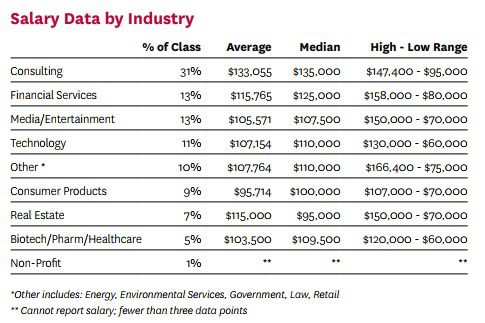
USC Marshall grad salaries, broken down by industry.
Pepperdine Graziadio School of Business and Management
Pepperdine Graziadio School of Business and Management graduates earned an average starting salary of $120,000, according to school statistics. Around 82 percent of Graziadio MBAs accepted job offers within three months of graduation.
Financial services, entertainment, technology, and consulting were the top industries to employ Graziadio MBAs.
For more information on the best Los Angeles MBA programs, check out our guide to the city. As well, learn more about which LA schools do not require GMAT or GRE scores here.
Your Guide to the Most Affordable MBA Programs in Dallas
An MBA provides professionals with increased career flexibility and greater earning potential. Unfortunately, the sizable cost of graduate school can be a hindrance to students motivated to earn an MBA. The shackles of student loan debt can haunt former students well into their professional lives.
Luckily, many schools appreciate the toll a high price tag can take on students, and offer more realistic fees and resources. With this in mind, we’ve laid out three of the most affordable Dallas MBA programs.
Commerce College of Business — Texas A&M University
The Texas A&M Commerce College of Business offers a relatively affordable experience for aspiring MBAs. The school is particularly sensitive to the financial stress pursuing MBA can cause. This is why the school follows the [In]tuition plan. Commerce’s [In]tuition guarantees the cost of commerce students’ educations will not will remain the same from registration until graduation, so that students do not have to worry about rising costs and fees from year to year. According to their tuition calculator, a graduate student who lives off campus and is a Texas resident could pay a tuition as low as $5,775.06 per year. The program averages about two years. Commerce accepts a long list of outside scholarships, and they offer institutional scholarships based on academic achievement.
The cost may also be reduced for students who completed the appropriate undergraduate courses, which could waive six pre-requisite courses. Commerce offers 13 minor options, such as Accounting, Business Analytics, Corporate Management, and Cyber Security. Commerce students benefit from the flexibility of the plethora of online courses offered by the school.
Naveen Jindal School of Management — University of Texas at Dallas
At the Naveen Jindal School of Management, residents pay around $32,998, factoring in tuition and fees, and nonresidents pay about $64,332 for the full-time MBA. In the past few years, the university offered scholarships to 75 percent of their incoming full-time MBA students. There are two types of merit-based scholarships for full-time MBAs in this program: Cohort and Corporate. These are both merit-based and students must apply to be considered.
U.S. News & World Report ranked Naveen Jindal as the 38th best business school in the country, which boasts an impressive 90 percent employment rate for full-time MBA grads. Students have recently gone on to earn high ranking positions at companies like Amazon and Toyota.
University of North Texas College of Business
As of the 2016-17 school year, the total cost of an MBA at University of North Texas College of Business was about $41,780 for residents and $56,468 for non-residents. At UNT, students can apply for a variety scholarships to cut tuition costs for many different types of students. For example, the Lupe Murchison Foundation Graduate Fellowship is a scholarship awarded to students, not based purely on need or academic achievement, but also on the student’s effort and promise.
UNT also offers a prestigious Online MBA for students looks for a more accommodating schedule. The school also offers afternoon, evening, and weekend classes for students looking for schedule flexibility, and who also wish to experience the on-campus community.
For more valuable information about the best MBA programs Dallas has to offer, check out our guide to the metro and which schools don’t require GMAT/GRE scores for admission.
San Diego Fowler College Alumni Join School as new Faculty
Three former students at the Fowler College of Business at San Diego State University have officially joined the business school as new professors.
Dr. Aaron Elkins (’03), Dr. Valerie Alexandra (’98), and Dr. Robert Briggs (’86) are returning to their alma mater to continue the school’s legacy, according to a recent press release. The three sat on the podium during their respective graduation ceremonies, receiving honors as top management information systems (MIS) undergraduates.
Their former professors played a major role in shaping them as professionals, and now as professors. Alexandra and Elkins will now be teaching alongside some of their most influential educators, Dr. Theo Addo and Dr. Bruce Reinig, respectively.
Briggs decided to return to the university as a professor because the university’s hard work toward becoming a leader inspired him. Briggs not only holds his MIS degree; he’s also an MBA graduate and art history buff. That was another one of his undergraduate degrees.
“When I was a student here in the ‘80s, SDSU was a regional commuter campus committed to excellent teaching,” Briggs said in the press release. “Now, SDSU also conducts nearly one-third of the grand-funded research for the entire CSU system and aspires to contribute even more. I wanted to be a part of that. I came back to help build research programs based on real-world issues that actually make a difference in the lives of real people.”
Alexandra, on the other hand, wants to give back to the community in the same way it gave to her—by teaching management. “When I joined SDSU as a student, I felt that I became a part of a diverse, thriving, creative, and caring community. The professors I met in my undergraduate program have been incredible mentors and instrumental in my academic and professional careers,” she said. “I came back to SDSU as a professor so that I could personally contribute on an everyday basis to the growth and development of our wonderful community.”
As for Elkins, he “came back for the people.”


















